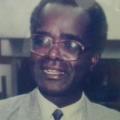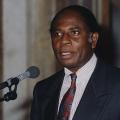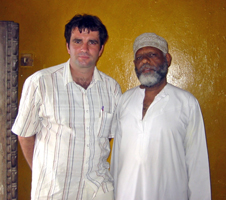26. Kai Kresse on the Anthropology of Philosophy
An interview with Kai Kresse (pictured here with Ustadh Mahmoud Mau) who discusses his efforts to do "anthropology of philosophy" on the Swahili Coast.
Themes:
• K. Kresse and A. Graness (eds), Sagacious Reasoning. H. Odera Oruka in Memoriam (New York: 1997).
• K. Kresse, “The Problem of How to Use African Language for African Thought. On a Multilingual Perspective in African Philosophy,” in African Philosophy 11 (1999), 27-36.
• K. Kresse, “Towards a Postcolonial Synthesis in African Philosophy: Conceptual Liberation and Reconstructive Self-Evaluation in the Work of Okot p'Bitek,” in O. Oladipo (ed.), Issues in African Philosophy: Essays in honour of Kwasi Wiredu (Ibadan: 2002), 215-32.
• K. Kresse, Philosophising in Mombasa: Knowledge, Islam and Intellectual Practice on the Swahili Coast (Edinburgh: 2007).
• K. Kresse, “Practising an Anthropology of Philosophy: General Reflections and the Swahili Context,” in M. Harris (ed.), Ways of Knowing: Anthropological Approaches to Crafting Experience and Knowledge (Oxford: 2007), 42-63.
• K. Kresse, “Can Wisdom be Taught? Kant, Sage Philosophy, and Ethnographic Reflections from the Swahili coast”, in M. Ferrari und G. Potworowski (eds), Teaching for Wisdom (Amsterdam: 2008), 189-206.
• K. Kresse and T. Marchand (eds), Knowledge in Practice: Expertise and the Transmission of Knowledge in Africa, special issue of Africa: Journal of the International African Institute, 79 (2009).
• K. Kresse, “Enduring Relevance: Samples of Oral Poetry on the Swahili Coast,” in Wasafiri: Journal of Contemporary Writing 26 (2011), 46-9.
• K. Kresse and O. Nyarwath (eds), Rethinking Sage Philosophy: Interdisciplinary Perspectives on and beyond H. Odera Oruka (Lanham: 2022).







Comments
Tentative list of episodes
Professor, I've noticed you haven't posted the list of tentative episodes for the next series on 'Slavery and the Creation of Diasporic African Philosophy' so far. This page doesn't also have the list of people that will be interviewed . https://historyofphilosophy.net/series/africana-slavery-diaspora
In reply to Tentative list of episodes by dukeofethereal
List
Don't worry, it's coming! We have it all mapped out, I just wanted to wait a bit until people had a chance to react to the list of upcoming Renaissance episodes. I'll post the list for the next Africana series in the coming week or so. Thanks for your interest!
Add new comment